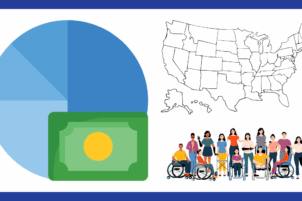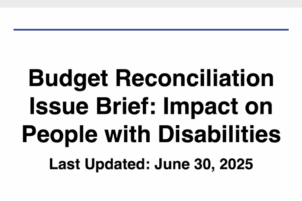108,638 New Jobs for Women with Disabilities in the U.S., 94,749 Lost Jobs for Men with Disabilities
Washington, D.C., March 5 – As we celebrate Women’s History Month, women with disabilities have particular reasons to celebrate. Comparing the annual disability statistics, the nonpartisan disability inclusion organization RespectAbility shows that approximately 108,000 women with disabilities entered the workforce in 2018.
This is a major accomplishment given that the disability community writ large struggled nationwide to add more workers to the economy. In fact, during the same time period, 94,749 working-age males with disabilities left the workforce. This means, in terms of job growth, there was just an increase of 29,893 jobs for people with disabilities in 2018, a ten-fold decrease compared to the more than 343,000 new jobs for people with disabilities two years ago.
RespectAbility wishes to take this opportunity to recognize the contributions made by women with disabilities and the critical contributions they and all women make to the United States. This includes more than 20,939,446 women living with a disability in the U.S., more than 10,176,489 million of which are working-age (18-64). Therefore, we would like to reflect on the realities and challenges that continue to shape the lives of women with disabilities.
Only 35.7 percent of working-age women with disabilities are employed in the U.S. compared to 72.8 percent of working-age women without disabilities. With fully one-in-four American adults having a disability, just 37.6 percent of those who are working-age are employed, despite polls showing that most of them want to work. This leads to approximately 14.5 percent of women with disabilities living in poverty compared to 22.9 percent of women without disabilities.
Comparing the data to the previous year, the 108,000 new jobs is even more impressive, as while 111,804 people with disabilities entered the workforce in 2017, 3,736 women with disabilities left the workforce in 2017. These losses had occurred even as other segments of the disability community continued to see job gains.
“People with disabilities of all backgrounds and genders deserve the opportunity to earn an income and achieve independence, just like anyone else,” said RespectAbility President Jennifer Laszlo Mizrahi, who has dyslexia and knows what it means to parent a child with multiple disabilities.
Women with disabilities gained jobs in 31 out of 50 states in 2018. Texas saw the biggest job gains among women with disabilities with more than 17,000 working-age women with disabilities entering the workforce, event that state’s overall disability employment rate is only 40.2 percent disability employment rate. Georgia saw the second-biggest gains with 15,568 new jobs for women with disabilities, though the Peach State only has a 36.3 percent disability employment rate.
However, in far too many states, women with disabilities are leaving the workforce, experiencing discrimination and being denied the opportunity to earn an income. The Commonwealth of Virginia saw the biggest job losses of any state with 7,987 women with disabilities leaving the workforce in 2018. Likewise, 6,122 women with disabilities left the workforce in North Carolina.
Women of Color Face Additional Barriers
The 2019 Annual Disability Statistics Compendium Supplement does not have female employment disaggregated by race. However, comparing the Compendium data to the past year’s information, 16,749 African Americans with disabilities gained jobs in 2018.
“About two and a half decades ago, Eddie Glenn called attention to the disparate treatment of African American women with disabilities, suggesting that a triple jeopardy syndrome put them at a further disadvantage because they were victims of race, gender and disability bias in our society,” said Donna Walton, Ed.D. “The impact of the triple jeopardy syndrome cannot be overstated, as an African American with a disability can never can be quite sure if their race, gender or disability is hurting their chances for advancement.”
“My experiences—being denied employment and facing financial planners who make false assumptions about my income status and earning potential because of my disability, for instance—prompt my suspicions that triple jeopardy is working against many African-Americans with disabilities,” added Dr. Walton.
Employment rates only tell part of the story. Looking across the intersection of disability and race, there are serious gaps in outcomes. Only 29.7 percent of African Americans with disabilities have jobs compared to 74.4 percent of African Americans without Disabilities. Likewise, only 39.4 percent of Latinx people with disabilities have a job compared to 76 percent of those without disabilities. Moreover, only 43.2 percent Asian-Americans with disabilities have jobs compared to 74.6 percent of Asians without disabilities.
Women with Disabilities Leading the Way
Some celebrities and business leaders are using their voice to share their stories, educating people about both visible and invisible disabilities. They are defying the statistics and have remained highly successful with their disabilities. These role models make a big difference in setting high expectations for youth with disabilities. People with disabilities of all backgrounds can be amongst the highest achievers on earth. Haben Girma became the first Deafblind person to graduate from law school when she earned her degree from Harvard Law School in 2013. Harriet Tubman had epilepsy, performer Selena Gomez lives with lupus, business leader and Shark Tank superstar Barbara Corcoran is dyslexic and gymnast Simone Biles has ADHD.
They are perfect candidates for RespectAbility’s #RespectTheAbility campaign, which is shining a light on individuals with disabilities who are succeeding in their chosen careers, as well as companies that employ people with disabilities:
- Simone Biles: Olympic & Disability Champion Makes History While Mesmerizing Many
- Shark Tank Entrepreneur Barbara Corcoran Proves Dyslexics Can Be Successful
- Lois Curtis: Woman with Disabilities Fights for Freedom For All
- Deafblind Lawyer Haben Girma Advocates for Disability Rights
- Selena Gomez Serves as Role Model for Young Women with Disabilities
- Salma Hayek, Role Model for Latina Woman with Disabilities
- Frida Kahlo, Role Model for Artists, People with Disabilities and Bisexual Women
- Cristina Sanz: First Hispanic with a Disability As Part of Ensemble Cast to Be on an Emmy Award-Winning Show
- Harriet Tubman, Legendary Poet and Civil Rights Activist with Epilepsy, Inspires Generations
- Maya Angelou, Legendary Poet and Civil Rights Activist Who Had Disability, Inspires Generations
- Selma Blair: Positive Role Model for Success
- Lori Golden, Self-Advocate and Trailblazer in Disability Inclusion in the Workplace
- Successful Pioneer of Change Janet LaBreck Serves as Role Model for African American Women with Disabilities
RespectAbility has also benefited from the work of our staff and Fellows, a majority of whom are women. Read about their experiences:
- This Women’s History Month, I Remember the #MeToo Survivors with Disabilities
Ariella, Spring 2019 Communications Fellow - At the Intersection of Deafness, Queerness and Being an Asian-American Woman
Kaity, Summer 2018 Communications Fellow - A Cute but Determined Woman with Cerebral Palsy: Believe It!
Emily, Spring 2019 Communications Fellow - Changing Media Perceptions, One Modeling Job at a Time
Tatiana, Spring 2019 Communications Fellow - Please Don’t Be My Knight in Shining Armor
Cami, Spring 2019 Nonprofit Management Fellow
Our nation’s economy is strongest when it is inclusive of the value that diverse talent brings to the workplace. These celebrities are making a difference in how audiences perceive disability. However, brand-name companies such as JP Morgan Chase, Coca-Cola, Pepsi, UPS, Ernst & Young, IBM, Walgreen’s, Starbucks, Walgreens and the software corporation SAP exemplify these values and have specific programs to hire, cultivate and promote people with disabilities. They show that people with disabilities are successful employees and also improve businesses’ bottom lines.
According to Vincenzo Piscopo of the Coca-Cola Company: “People with disabilities bring a unique skill set that it is very valuable for companies. As it relates to employment and competitiveness in the workplace, we have to stop thinking of disability as a weakness and start thinking of it as an asset.”
The Census Bureau estimates that there are, in total, more than 56 million Americans living with some form of disability. This can include visible conditions such as spinal cord injuries, visual impairments or hearing loss to people living with nonvisible disabilities such as learning disabilities, mental health or Autism.
The celebrities mentioned above are especially important to acknowledge during Women’s History Month. However, their work should be valued and appreciated year-round. RespectAbility will be highlighting additional female celebrities, as well as those who have made important policy advancements, with disabilities throughout the entire month.







